UNIT12
人教版英语九年级全一册--短语表 Unit 12

序号英文中文1be full of ...=be filled with..充满了...2take a shower=get in the shower洗淋浴3by the time在..以前;到...时候为止4by dinner time在晚饭以前5get outside出去6leave my keys in the backpack把钥匙落在包里7get /go back to school=return toschool返回学校8walk /go into...走进..9be late for ...上课迟到10go off闹钟大响11keep doing sth.一直不断地做某事12wake up醒来13rush out the door冲出大门14rush to...冲向...15brush one's teeth刷牙16wash one's face洗脸17give sb a lift /ride捎某人一程;让某人搭便车18at least至少19get to =arrive in/at到达20end up doing sth.以做某事结束21be about to do sth.打算做某事22decide to do sth.决定做某事23even though =even if即使24wait in line with与..排队等候25what'sgoing on?=what'shappening?发生什么事了?26in disbelief难以置信地27stare at紧盯着地面28jump out of ...从..跳起来29go straight to..径直奔向...30take off起飞;脱掉31hear about /of听说;得知32turn into变为;转化为33show up赶到;露面人教版英语九年级全一册短语--Unit 1234forget to do sth忘记去做某事35forget doing sth.忘记做过某事36say goodbye to sb向某人道别37say hello to sb向某人问好38leave for离开..去..39by the end of ...到..末为止40get dressed穿衣服41run out of ..用光42the most believable最可信的43the least believable最不可信的44run away from...逃离45 on the first day of school在开学的第一天46on one's back在某人的背上47in the middle of the road在路的中间48turn around掉头49lead to通向;导致50make an unexpected discovery有了一个意想不到的发现51cancel the plan取消计划52hand in上交53walk home from school从学校步行回家54change the clock to an hourearlier把闹钟调得比原来快一个小时。
人教版九年级英语课件:Unit12(共49张PPT)
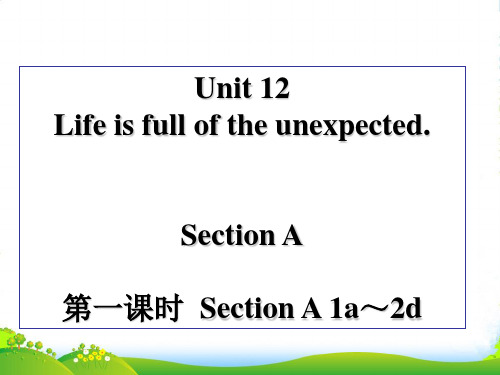
2. As I was waiting in line with other office workers, I
heard a loud sound. 当我正在和其他办公室职员排队时,我听到了一声巨响。 as意为“当……的时候”,as可表示主句和从句的动作 同时发生或同时持续,引导时间状语从句。 如:As years go by, China is getting richer and stronger. 随着时间一年一年地过去,中国变得越来越富强了。
A. begins B. begin C. beginning D. have begun ( C)(2)I ____ do my homework when my father came in.
A. am going to B. was going C. was about to D. am about to
课堂同步
一、阅读课本第90页2d,回答问题。 1. Why was Kevin late for class? _B__e_ca_u_s_e_h_i_s_a_l_a_rm__c_l_o_c_k_d_i_d_n_’t_g_o__o_ff_._________ 2. Did he eat breakfast? _N__o_, _h_e_d_i_d_n_’t_.____________________________ 二、阅读课本第90页2d,选择正确答案。 (C )1. What time did Kevin wake up?
课文导学
人教版英语九年级全册Unit 12知识点详解及练习
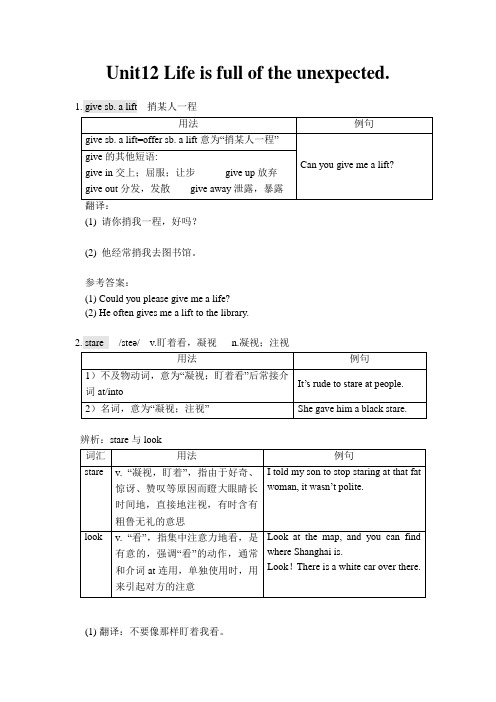
Unit12 Life is full of the unexpected.1. give sb. a lift 捎某人一程(1) 请你捎我一程,好吗?_______________________________________________________________ (2) 他经常捎我去图书馆。
_______________________________________________________________ 参考答案:(1) Could you please give me a life?(2) He often gives me a lift to the library.2. stare /steə/ v.盯着看,凝视n.凝视;注视辨析:stare与look(1)翻译:不要像那样盯着我看。
___________________________________________________________________ (2) Emily ____ the young man hard and finally shamed him into giving up his seatto the old lady.A. stared onB. stared atC. stared forD. stared with参考答案:(1) Don’t stare at me like that.(2) B3. above /əˈbʌv/ prep.在...上面adv.在上面辨析:above,on与over选词填空:above/on/over(1)The plane is flying _____ the clouds.(2)There are five books _____ the desk.(3)There is a bridge _____ the river.(4)I hope the price of the dress will not be____$20.参考答案:(1)above (2)on (3)over (4)above4. burn /bɜ:n/ v.着火;燃烧burn--burnt / burned--burnt / burned辨析:burn, burned与burning(1)翻译:燃烧的旅馆位于城市中心。
Unit12 综合训练

第一部分(选择题) Ⅰ. 听音理解(共三节,20 小题,每小题1.5分,满分 30 分) 第一节 听句子 听下面五个句子,从每小题所给的三幅 图中选出与句子内容相符的选项。(每个句子读两遍)
( A )1.We had great fun going boating in the park on Saturday morning.
第三节 听短文 根据所听到的内容及要求完成表格,每 空一词。(短文读三遍)
Hi Sam! I’m having a great time in Vietnam. We arrived three days ago and now we’re camping by a lake in the forest. The weather is very hot and sunny.
A.
B.
C.
( B )2.I was tired,because I stayed up late to study for the test yesterday.
A.
B.
C.
( C )3.We went to the beach for the summer vacati)4.Tina took the 12-hour train ride to the countryside for a volunteer work.
( A )9.What problem did the man have last weekend? A.He couldn’t fly a kite. B.His work didn’t do well. C.Nobody helped to look after his daughter.
牛津版六年级上册Unit 12 知识点总结

Unit 12 知识点总结【单词】Earth, part, forest(可数), land(不可数), ocean(可数), rubbish(不可数), sick, recycle, glass, own, so many, pick up, shopping bag, plastic bag, save 拯救;节约cut — cut(过去式)cut — cut t ing(现在分词形式)【短语】1.cut down 砍倒2.live on 住在......上We live on the Earth.3.work together 一起工作4.keep the Earth clean and healthy5.pick up6.plant trees7.ride a bike more oftenride bikes more often【语法】1.should + 动词原形2.stop + 动词ing3.so many 这么多+ 可数名词复数4.anything 用于疑问句和否定句Can we do anything to help the Earth?something一般用于肯定句5.throw...into...把......扔进......里6.write on...写在......上We should write on both sides of paper.我们应该在纸的两面书写。
【句子】1.We should stop cutting down so many trees.2.It’s the E arth.3.The green and brown parts are forest s and land.4.The Earth was very clean and beautiful in the past, but now some parts are dirty.7.We should stop throwing rubbish into rivers(河流;可数名词).8.We should stop cutting down so many trees.9.We should stop using plastic bags.10.We live on the Earth. The Earth is a beautiful place. There are rivers, oceans, land and forests. There are many different plants and animals too.11.Smoke from cars and factories makes the air dirty. The Earth gets sick (get sick 生病).12.Now people work together to keep the Earth clean and healthy. They pick up rubbish. They plant trees every year.13.They recycle glass and paper. They bring their own shopping bags and stop using plastic bags.14.We should not litter(动词;扔垃圾).【写作】P.85 Think and writeThe Earth is sick!The Earth was clean and beautiful. Now some parts are dirty. We should stop throwing rubbish into rivers and oceans. We should stop cutting down so many trees.We should stop using plastic bags. We should pick up rubbish. We should plant trees every year. We should recycle glass and paper. We should work together to keep the Earth clean and healthy.。
人教版九年级英语Unit12知识点总结
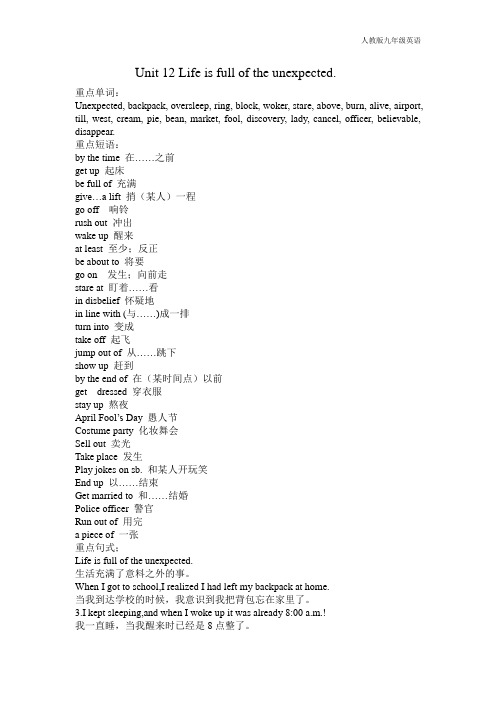
Unit 12 Life is full of the unexpected.重点单词:Unexpected, backpack, oversleep, ring, block, woker, stare, above, burn, alive, airport, till, west, cream, pie, bean, market, fool, discovery, lady, cancel, officer, believable, disappear.重点短语:by the time 在……之前get up 起床be full of 充满give…a lift 捎(某人)一程go off 响铃rush out 冲出wake up 醒来at least 至少;反正be about to 将要go on 发生;向前走stare at 盯着……看in disbelief 怀疑地in line with (与……)成一排turn into 变成take off 起飞jump out of 从……跳下show up 赶到by the end of 在(某时间点)以前get dressed 穿衣服stay up 熬夜April Fool’s Day 愚人节Costume party 化妆舞会Sell out 卖光Take place 发生Play jokes on sb. 和某人开玩笑End up 以……结束Get married to 和……结婚Police officer 警官Run out of 用完a piece of 一张重点句式;Life is full of the unexpected.生活充满了意料之外的事。
When I got to school,I realized I had left my backpack at home.当我到达学校的时候,我意识到我把背包忘在家里了。
Unit 12
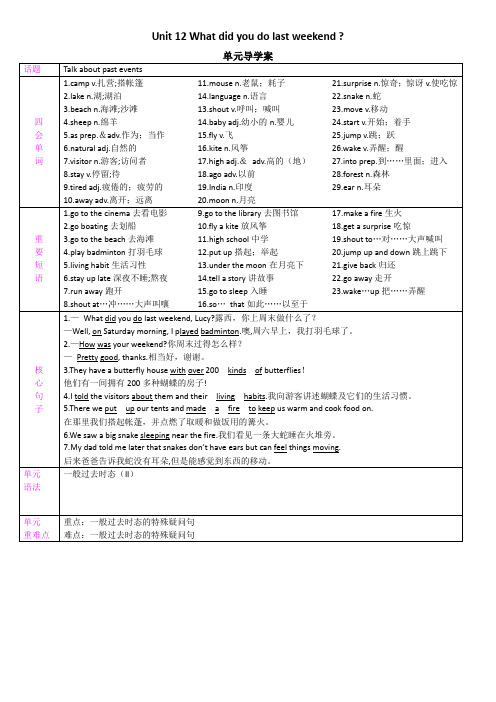
Unit 12 What did you do last weekend ?第一课时Section A (1a~2d)自主预习案学生自学新单词(教材P67-68),比一比,看谁记得又快又准。
1.camp v.扎营;搭帐篷ke n.湖;湖泊3.beach n.海滩;沙滩4.sheep n.绵羊5.as prep.&adv.作为;当作6.natural adj.自然的7.visitor n.游客;访问者8.tired adj.疲倦的;疲劳的9.stay v.停留;待学生自查并写出本课短语(教材P67-68),读一读,记一记。
1.go to the cinema 去看电影2.go boating 去划船3.go to the beach 去海滩4.play badminton 打羽毛球5.living habit 生活习性6.stay up late 深夜不睡;熬夜湖边野营Step 1 情景导入Teacher:How was your last weekend?Student1:It was very good.Teacher:What did you do last weekend?Student 1:I milked the cows.Teacher:What did you do last weekend?Student 2:I visited my grandmother.…环节说明:由师生问答的形式直接引出本节课要学的语言目标一般过去时态,简单明了,直奔主题。
Step 2 完成教材1a-1c 的任务1.教师领读1a中的单词或词组,学生跟读并且识记,然后两人一组互相提问。
2.认真观察图片,将图片和1a中所给的短语匹配,集体核对答案,完成1a。
3.大声朗读图片中的小对话,为听力训练做好准备。
4.认真听录音,根据听力内容在每张图片上填上事情发生的时间morning, afternoon和evening。
人教版九年级英语Unit12单词、课文知识梳理,词汇句式精讲
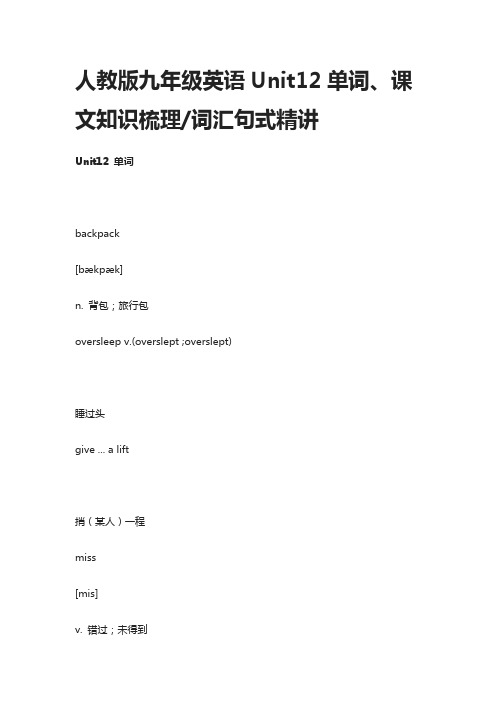
人教版九年级英语Unit12单词、课文知识梳理/词汇句式精讲Unit12 单词backpack[bækpæk]n. 背包;旅行包oversleep v.(overslept ;overslept)睡过头give ... a lift捎(某人)一程miss[mis]v. 错过;未得到unexpected[ʌnikspektid]a.出乎意料的;始料不及的block[blɔk ]n. 街区worker[wə:(r)kə(r)]n. 工作者;工人stare[steə]v. 盯着看;凝视disbelief[disbili:f]n. 不信;怀疑above[ əbʌv]adv. 在上面;向上面pre在上面burn[bə:(r)n]v. (burnt; burned ) 着火;燃烧alive[ əlaIv]adj. 活着;有生气的take off(飞机等)起飞;匆忙离开till[til]conj. & pre到;直到west[west]adv. 向西;朝西adj. 向西的;西部的n. 西;西方cream[kri:m]n. 奶油;乳脂boss[bɔs]n. 老板;领导pie[pai]n. 果馅饼;果馅派course[kɔ:(r)s]n. 课程bean[bi:n]n. 豆;豆荚[ma:(r)kit]n. 市场;集市costume[kɔstju:m]n.服装;装束embarrassed [imbærəst] adj.窘迫的;害羞的announce[ ənauns]v. 宣布;宣告spaghetti[spəgeti]n. 意大利面条hoaxn. 骗局;恶作剧discovery[diskʌvəri]n. 发现;发觉lady[leidi]n. 女士;女子officer[ ɔfisə]n.军官;官员believable[bili:vəbl]adj.可相信的;可信任的embarrassing[imbærəsiŋ]a. 使人害羞的(难堪的或惭愧的)New Zealand[nju:zi:lənd]新西兰Italy[Itəli]意大利Mars[ma:(r)z]火星Carl[ka:(r)l]卡尔(男名)OrsonWelles[ɔ:(r)sən; welz]奥森•韦尔斯Unit12 知识梳理【重点短语】1. take a shower洗浴2. leave my backpack at home 把背包忘在家里3. get back to school 返回学校4. start teaching 开始教学5. go off 响铃6. rush out the door 冲出房门7. give sb a lift 捎某人一程8. miss both events 错过两个事件9. full of unexpected 充满着不可预知性10. be about to do sth 正要做某事11. stare in disbelief at 难以置信地盯着。
- 1、下载文档前请自行甄别文档内容的完整性,平台不提供额外的编辑、内容补充、找答案等附加服务。
- 2、"仅部分预览"的文档,不可在线预览部分如存在完整性等问题,可反馈申请退款(可完整预览的文档不适用该条件!)。
- 3、如文档侵犯您的权益,请联系客服反馈,我们会尽快为您处理(人工客服工作时间:9:00-18:30)。
1.不要在走廊跑步 2.上体育课穿运动鞋
3.我们需要穿制服吗? Do we have to wear the uniform?
4.练习吉它
5.在外面吃
practice the guitar eat out Please open the door.
6.请开门。
单项选择
A 1. We don‟t have to _______ the uniforms. A. wear B. put on C. have on D. dress C 2. She can‟t watch TV ______ school night. A. in B. at C. on D. \ D 3. We can‟t ________ late for class. A. get to B. arrive at C. arrive in D. arrive D 4. Students can‟t ________ the music in the classroom. A. hear B. hear to C. listen D. listen to A 5. There are too ______ rules in the school. A. many B. much C. a lot of D. some
词 条 too many too much 词 条 用
区 别 后接可数名词复数 后接不可数名词 法 举 例
too many
too much
“太多”常用作 There is too 形容词,修饰不 much rain here. 可数名词。 “太”常作副词, It is much 后接副词或形容 too hot. 词
“必须”考察must与have to
had too much fun 4.They ________________(有很多乐趣)on weekends.
don‟t have to 5.You ________________(不必)wear a coat for gym class.
翻译下列短语和句子。 Don‟t run in the hallways. wear sports shoes for gym class
单项选择 B 1.____ late. It‟s your first day to work. A. Don‟t to B. Don‟t be C. Don‟t D. No B 2.-______sing! -All right. A. Let B. Let‟s C. We let D.Let me A 3.When will the train ______? A. arrive B. arrive at C. reach D. arrive in A 4.I ______ but I _______ nothing. A. listened; heard B. listened; hear C. heard; heard D. heard; listened A 5.The girl ______ the red dress is Jill Green. A. with B. wear C. put on D. in
第八组
The man who has never made a mistake will never make anything else.
从来不犯错误的人将一事无成
words
rule:(1)rule用作动词,意为“规则” They are talking about rules. 他们正在讨论规章制度。 (2)rule用作名词,意为“常规,惯例” Rainy weather is the rule in London. 伦敦总是雨天。 (3)rule用作名词,意为“管理,统治” India was once under the rule of British. 印度曾受过英国统治。 (4)rule用作动词意为“统治,管辖” King Charles I ruled England. 英王查理一世统治英国。
fall slee sleep 意为睡着强调进入睡眠状态,且多用 于否定句、疑问句或条件句中。
go to bed 意为就寝,上床准备睡觉的动作。
祈使句是用来表示请求、命令、建议的句子。 它的特点是通常设置主语,多义动词原形开始,句尾用感叹 号或感叹号,朗读时常用降调。 “类”型: 1.P型:Please +动词原形+·· · ·· · 表示客气的请求,有时please放在句尾,其前加逗号。 2.L型:Let +宾格代词+动词原形+··· ·· 表示请求或建议 3.V型:V(动词原形)+宾语+· · ·· ·· 表示命令 4.B型:Be +表语(动词或形容词)+· · ·· ·· 强调表达的内容 5.D型:Don‟t +动词原形+·· · ·· · 是否定祈使句,表示告诉某人不要做某事 6.N型:No +名词或动词+·· · ·· · 这种否定祈使句多用于公共警示语。
(5)他是穿过田野过来的,不是沿马路。 by He came through the field ,not _____ the road ______ .
can/could 与 be able to (1)can“能、会”,其否定形式为can‟t,过去式是 could,couldn‟t,表示做某 事的能力。 Can you lift the box? 你能举起这个箱子吗? (2)can/could作“能、会”相当于be able to。前者仅 有现在时和过去时两种形式,而后者有多种时态。 Are you able to lift the box? 你能举起这个箱子吗? (3)be able to多只经过一番努力才能实现目标的能力, 常表示具体场合的 能力。 She studied hard and she is able to pass the exam. 她刻苦学习,她能够通过考试。
by的作用
(1)by用作介词,意为“到(某时)之前,不迟于” I have to go back by ten o‟clock. 我必须十点前回去。 (2)by用作介词,意为“在···旁边;在··· ··· ··· 近旁” There is a park by the river. 河边有一个公园。 (3)by用作介词,意为“沿、经、由” You can go by the hallway. 你可以走公路。 (4)by用作介词,意为“用;靠;通过”,表示方法、手段等。 You can go to school by bike. 你可以骑自行车去上学。 (5)by用作介词,意为“因···;以···;借助于······” ··· ··· I did it by mistake. 我误做了这件事。
词 条 sleep be sleep
区
别
强调睡觉这一动作,是延续性动词, 可表示时间段状语连用。 表睡着的状态,是系表结构,其中 asleep不能用very修饰,只能用 sound,fast等修饰。 表睡着,表示一个动作的过程,侧重 于自然地入睡。 指入睡这个动作,相当于begin to sleep
单项选择 D (1)She_____come early next time. A.don‟t have to B.hasn‟t to C.doesn‟t has to D.doesn‟t have to (2)---Must I come at four o‟clock? C ---Oh ,no,you_____. A.don‟t B.mustn‟t C.don‟t have to D.can‟t (3)---Does she have to get up so erly tomorrow morning? D ---Yes ,she_____. A.is B.have C.has D.does
翻译下列各句
1.咱们一起玩吧!
2.请不要上学迟到.
Let‟s play together! Please don‟t late for schoo. Please answer this question.
Let‟s go shopping! No smoking!
3.回答这个问题.
4.咱们去购物吧! 5.不要吸烟!
words
outside:(1)outside用作副词,意为“在外部,在外面” Please waite outside . 请在外面等候。 (2)outside用作介词,意为“在···的外面” ··· We are waiting outside the house. 我们在房子外面等。 (3)outside用作形容词,意为“局部的,意外的” We need outside help for this job. 我们的这项工作需要外界的帮助。 (4)outside用作名词,意为“外部,外面” The outside of the house needs painting. 房子外部需要油漆。
用can/could和be able to填空
Can (1)______ I help you? could (2)When he was young,he ______swim very fast. can (3)It was cold that no one ______ stay outside. can (4)She ______ not look after herself then. are able to (5)We will ___________ learn English well soon.
根据汉语写句子 (1)每天晚上我必须九点前睡觉。 by nine I must go to bed _____ _____ o‟clock every night. (2)我妹妹通常骑自行车去上学。 by bike My sister usually goes to school _____ _____ . (3)来,坐在我身边。 by me Come and sit _____ _____ . (4)在超市旁有一个公用电话亭。 by the supermarket There is a pay phone ______ ______ ___________ .
